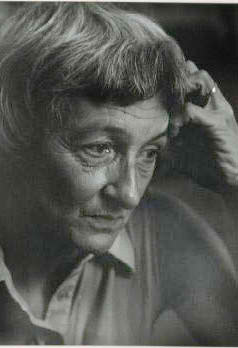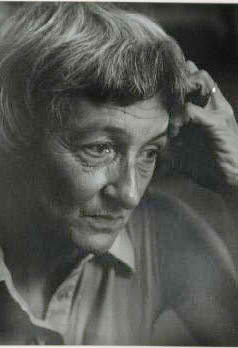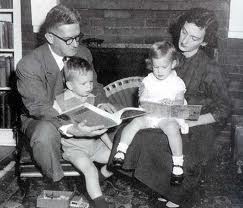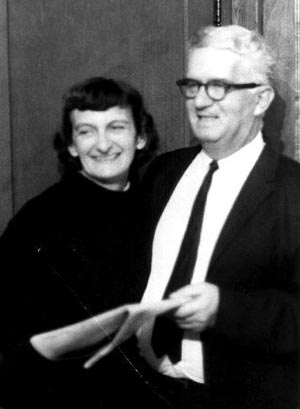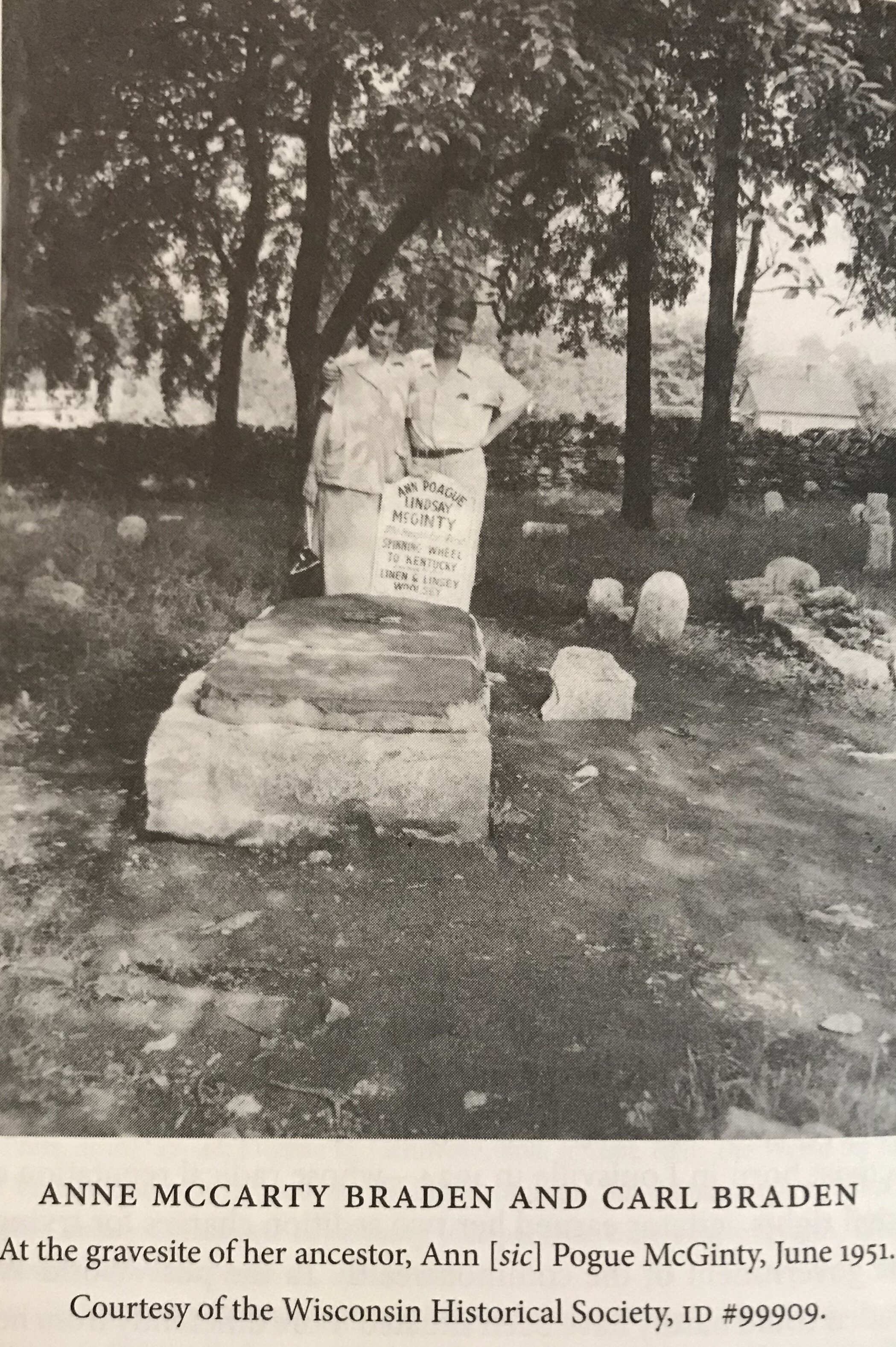There, she met Carl Braden, a fellow reporter (left-wing trade unionist) who was active in progressive politics. They were married in 1948. She became a supporter of the civil rights movement at a time when it was unpopular among southern whites.
Anne Braden's work in the name of justice spans more than five decades and crosses paths with both the legendary and the unsung heroes of the southern freedom movement. Her talent as a journalist and passion as an activist makes for a dynamic combination of not only relaying the stories of injustice in the world but also working to change them.
From 1957 until 1973, she worked with the Southern Conference Educational Fund (SCEF), an interracial organization across the South whose mission was to bring whites into the activities of the civil rights movement, and edited its publication, The Southern Patriot. Despite being the target of frequent attacks from mainstream political groups as well as governmental agencies, the SCEF proved to be extremely resilient and is often credited with playing a key role in the dissolution of the House Un-American Activities Committee (HUAC) in 1975. Nonetheless, the impact of the red-baiting and being labeled subversives took its toll on the SCEF and on the Bradens, turning some other civil rights groups against them for fear of being labeled in the same way. After 1975, Braden worked with the Southern Organizing Committee for Economic & Social Justice (SOC) as well as several other regional and national organizations.
Anne and Carl Braden shared a deep concern for racial and economic justice and the two of them where a frequent target of attacks.
In 1954, as a method of protesting the rigid practice of racial segregation in neighborhoods, the Bradens arranged to purchase a house in an all-white neighborhood of Louisville and deed it over to Andrew Wade and his wife, who were African American. White supremacists lashed out at this act and tried to intimidate the Wades with cross burnings and bombings. Anne carefully chronicled the ordeal and used it as the basis for her book The Wall Between, which was published in 1958 and was runner-up for the National Book Award that year. As a result of their actions, Carl Braden was charged with sedition, since working for racial integration was interpreted by many southern whites as an outright sign of communist support. He was sentenced to 15 years and ended up serving eight months before he was released on the highest bond ever set in Kentucky up to that time.
In 1967, the Bradens were again charged with sedition for protesting the practice of strip-mining in Pike County, Kentucky. Fortunately, they were able to use this case to test the Kentucky sedition law, which was eventually ruled unconstitutional.
Braden dedicated her life to impelling whites into the cause of justice for all people. After her husband's death, she remained active in networks of anti-racist work and provided inspiration for many who did not otherwise see themselves as part of the movement as they understood it. She worked on Jesse Jackson's presidential campaign during the 1984 and 1988 elections, and was an active member of St. George's Episcopal Church in Louisville. Her story encourages a sense of the connectedness of peace and justice struggles across a wide range of communities.
The Bradens had three children: James, born in 1951, a 1972 Rhodes Scholar, and a 1980 graduate of Harvard Law School (where he preceded Barack Obama as editor of the Harvard Law Review), has lived and practiced law for over 25 years in San Francisco, California. Elizabeth, born in 1960, has worked as a teacher in many countries around the world, serving as of 2006 in that capacity in rural Ethiopia. Anita, born in 1953, died of a pulmonary disorder at age 11. While raising their children, the couple remained deeply involved in the civil rights cause and the subsequent social movements it prompted from the 1960s to the 1970s.
She received the American Civil Liberties Union's first Roger Baldwin Medal of Liberty in 1990 for her contributions to civil liberties. As she aged, her activism focused more on Louisville, where she remained a leader in anti-racist drives and taught social justice history classes at local universities. Anne Braden died on March 6, 2006. The Anne Braden Institute for Social Justice Research was established at the University of Louisville in November, 2006 and was officially opened on April 4, 2007. The institute focuses on social justice globally, but concentrates on the southern United States and the Louisville area. Over her nearly six decades of activism, her life touched almost every modern U.S. social movement, and her message to them all was the centrality of racism and the responsibility of whites to combat it.
Anne Braden. "The Wall Between", (original edition 1958), Knoxville: University of Tennessee Press, 1999.
Anne Braden. "Uphill All the Way," They Took Their Stand, edited by Emma Gelders Sterne, NY: Crowell-Collier Press, 1968
There, she met Carl Braden, a fellow reporter (left-wing trade unionist) who was active in progressive politics. They were married in 1948. She became a supporter of the civil rights movement at a time when it was unpopular among southern whites.
Anne Braden's work in the name of justice spans more than five decades and crosses paths with both the legendary and the unsung heroes of the southern freedom movement. Her talent as a journalist and passion as an activist makes for a dynamic combination of not only relaying the stories of injustice in the world but also working to change them.
From 1957 until 1973, she worked with the Southern Conference Educational Fund (SCEF), an interracial organization across the South whose mission was to bring whites into the activities of the civil rights movement, and edited its publication, The Southern Patriot. Despite being the target of frequent attacks from mainstream political groups as well as governmental agencies, the SCEF proved to be extremely resilient and is often credited with playing a key role in the dissolution of the House Un-American Activities Committee (HUAC) in 1975. Nonetheless, the impact of the red-baiting and being labeled subversives took its toll on the SCEF and on the Bradens, turning some other civil rights groups against them for fear of being labeled in the same way. After 1975, Braden worked with the Southern Organizing Committee for Economic & Social Justice (SOC) as well as several other regional and national organizations.
Anne and Carl Braden shared a deep concern for racial and economic justice and the two of them where a frequent target of attacks.
In 1954, as a method of protesting the rigid practice of racial segregation in neighborhoods, the Bradens arranged to purchase a house in an all-white neighborhood of Louisville and deed it over to Andrew Wade and his wife, who were African American. White supremacists lashed out at this act and tried to intimidate the Wades with cross burnings and bombings. Anne carefully chronicled the ordeal and used it as the basis for her book The Wall Between, which was published in 1958 and was runner-up for the National Book Award that year. As a result of their actions, Carl Braden was charged with sedition, since working for racial integration was interpreted by many southern whites as an outright sign of communist support. He was sentenced to 15 years and ended up serving eight months before he was released on the highest bond ever set in Kentucky up to that time.
In 1967, the Bradens were again charged with sedition for protesting the practice of strip-mining in Pike County, Kentucky. Fortunately, they were able to use this case to test the Kentucky sedition law, which was eventually ruled unconstitutional.
Braden dedicated her life to impelling whites into the cause of justice for all people. After her husband's death, she remained active in networks of anti-racist work and provided inspiration for many who did not otherwise see themselves as part of the movement as they understood it. She worked on Jesse Jackson's presidential campaign during the 1984 and 1988 elections, and was an active member of St. George's Episcopal Church in Louisville. Her story encourages a sense of the connectedness of peace and justice struggles across a wide range of communities.
The Bradens had three children: James, born in 1951, a 1972 Rhodes Scholar, and a 1980 graduate of Harvard Law School (where he preceded Barack Obama as editor of the Harvard Law Review), has lived and practiced law for over 25 years in San Francisco, California. Elizabeth, born in 1960, has worked as a teacher in many countries around the world, serving as of 2006 in that capacity in rural Ethiopia. Anita, born in 1953, died of a pulmonary disorder at age 11. While raising their children, the couple remained deeply involved in the civil rights cause and the subsequent social movements it prompted from the 1960s to the 1970s.
She received the American Civil Liberties Union's first Roger Baldwin Medal of Liberty in 1990 for her contributions to civil liberties. As she aged, her activism focused more on Louisville, where she remained a leader in anti-racist drives and taught social justice history classes at local universities. Anne Braden died on March 6, 2006. The Anne Braden Institute for Social Justice Research was established at the University of Louisville in November, 2006 and was officially opened on April 4, 2007. The institute focuses on social justice globally, but concentrates on the southern United States and the Louisville area. Over her nearly six decades of activism, her life touched almost every modern U.S. social movement, and her message to them all was the centrality of racism and the responsibility of whites to combat it.
Anne Braden. "The Wall Between", (original edition 1958), Knoxville: University of Tennessee Press, 1999.
Anne Braden. "Uphill All the Way," They Took Their Stand, edited by Emma Gelders Sterne, NY: Crowell-Collier Press, 1968
Family Members
Sponsored by Ancestry
Advertisement
Advertisement
